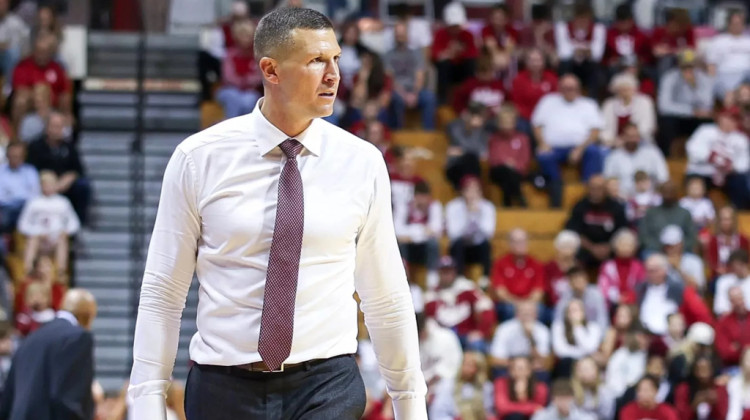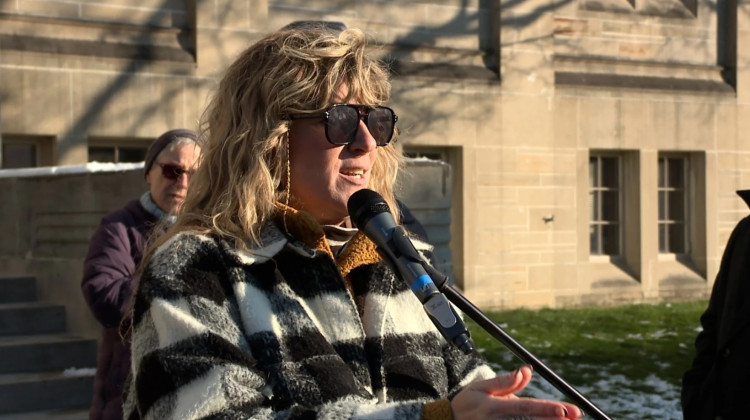
Indianapolis Public Schools leaders want to address underused and poor quality school buildings. A recent report found IPS-owned facilities operate at a 60 percent utilization rate
Eric Weddle/WFYI
Indianapolis Public Schools families are raising concern over an expansive proposal from district leaders to potentially close school buildings and revamp grade level configurations. Some parents plan to speak out at this week's school board meetings to try and stall a vote expected this fall on a yet-to-be released formal plan.
At the end of June, IPS Superintendent Aleesia Johnson announced an early version of the plan during a community meeting as part of the district’s “rebuilding stronger” campaign. The initiative, started last September, aims to improve learning outcomes for underserved students and prevent the district from facing a $25 million annual deficit by 2027.
District leaders also want to address its underused and poor quality school buildings. A recent report found IPS-owned facilities operate at a 60 percent utilization rate and there is nearly $500 million needed for repairs and improvements.
During the June meeting, Johnson briefly described five major changes, including: close some school buildings and turn all elementary schools into K-5 configurations and create 6-8 middle schools.
Johnson's proposed plan would also:
- Replicate school models that are proven to increase academic performance for students of color.
- Create enrollment zones that include multiple school models so families can choose where their student will attend.
- And eliminate priority zone enrollment that gives preference to families with homes located within a half-mile radius of a choice school option.
The district has said they will release a formal proposal in late August or September, before the board of commissioners is scheduled to vote on it in October. An update on the effort is scheduled for Thursday’s 6 p.m. board meeting at the Finney Education Center.
Stacey Young, a mother of three students at Rousseau McClellan Montessori School 91, first heard about the district’s proposed plans to restructure and potentially close schools back in late June.
“To roll something out that's this big that creates such a huge change in neighborhoods and families and districting and choices of where we go to school — that is not a four month deal,” Young said about the time between the proposed ideas and expected vote by the IPS board. “In my opinion, it's not something that people should accept.”
She has two third graders and a sixth grader at School 91 because her family wanted the K-8 model, as well as the Montessori structure, which provides students with more agency in their education and allows each child to learn at their own pace. Young, who is White, also appreciates the racial and economic diversity in the classrooms.
Young is against removing the K-8 model because she believes it better supports learning because students are in the same school for many years. She also thinks the extended grade configuration helps the district enroll students longer, rather than giving families an opportunity to consider grade 6 at a township or private school.
She is not alone in her concerns. Last month, more than a dozen parents from School 91 provided written and in-person public comments to the IPS board of commissioners. They are against removing K-8 schools and want commissioners to extend their decision making timeline. Some worry a final vote could come too fast when some families still don't know these discussions are underway.
Parents worry other families might not know about the plan because they were on vacation, working or juggling other responsibilities when it was released earlier this summer.
That was Jennifer Walker’s experience – she heard about the plan last week through a text message from the district.
“I'm kind of confused about it,” said Walker, a Black parent at Edison School of the Arts School 47. “I really don't know what — what are they trying to do? I really don't understand it too much.”
Walker believes the district has done its job to notify parents, but she just hasn’t had the time to look through the plan yet. School 47, where Walker’s son attends, currently serves kindergarten through eighth graders. She said she wouldn’t be upset if the district switched to a K-5 model.
She thinks students attending a 6-8 middle school would help them mature.
“I really don't think that it will harm anyone [or] cause any students to regress or anything,” Walker said. “I think change is positive — especially that kind of change.”
IPS father Mandla Moyo said it’s been difficult to stay engaged in the district’s process and thinks it should have implemented more equitable approaches to reaching families. The district led meetings around this topic at different schools each month for roughly three months, but Moyo said they also should have held them at different times and provided a live-streaming option to accommodate more families.
Videos of each meeting and related documents are available on the IPS website.
Moyo, who has a first grader at the Center for Inquiry School 2, said he would be upset if the district switched his son’s school from a K-8 to a K-5. Even if sweeping changes are made, he doesn’t think his family would leave the district, and maybe not even the school. But Moyo, who is Black, does want to see IPS institute more equitable initiatives so more students have the opportunity to attend higher performing schools that offer unique learning programs.
“We need to make sure that whatever the district decides or whatever the community sort of ends up with, that the plan looks as equitable as possible to ensure that we're not leaving students behind just because they don't fit into a model or don't fit into a space that IPS is sort of trying to take the district to,” Moyo said.
This is not the first time IPS has attempted to address its surplus of schools. In 2018, IPS leaders agreed to reduce the amount sought in a property-tax referendum in exchange for support from the Indy Chamber and its partners. IPS leaders at the time said more than a dozen schools could be closed as part of the deal.
Contact WFYI education reporter Elizabeth Gabriel at egabriel@wfyi.org. Follow on Twitter: @_elizabethgabs.
 DONATE
DONATE







 Support WFYI. We can't do it without you.
Support WFYI. We can't do it without you.